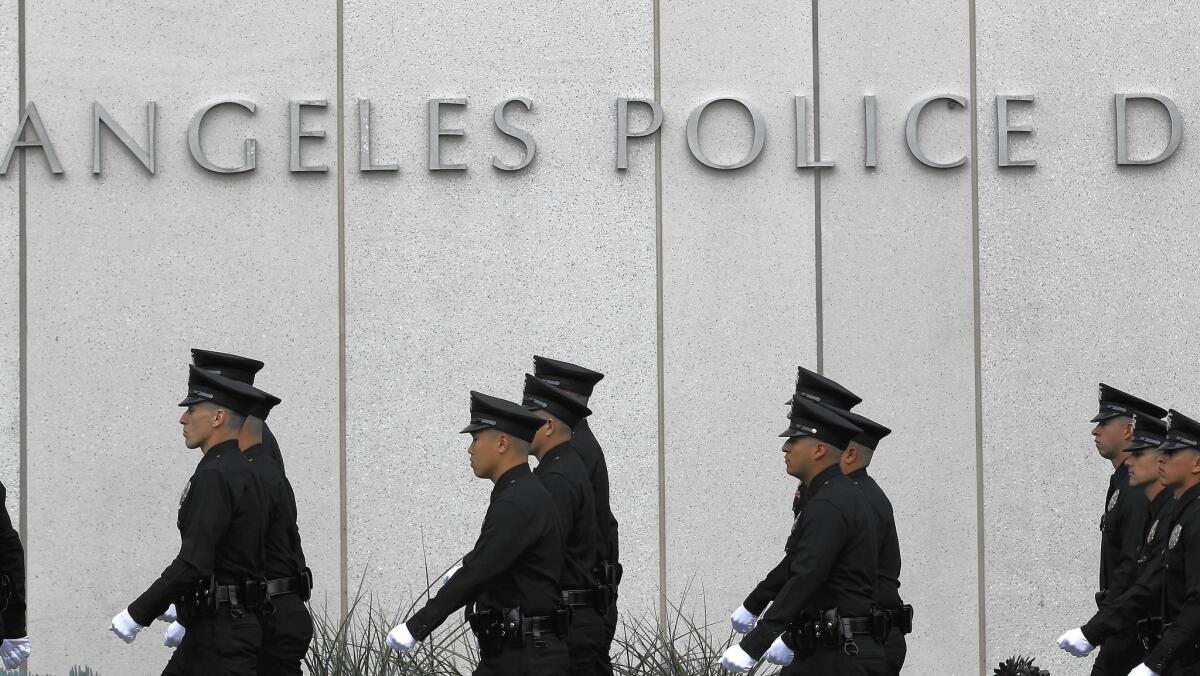After killing of Iranian general, California authorities boost security, eye Iranian assets

- Share via
The escalation of tensions between the United States and Iran has local law enforcement on alert, though officials stress there is no specific threat.
Law enforcement sources told The Times that agencies have stepped up patrols at transit hubs and other key potential targets, which is a standard response to terrorist acts and other national security threats. The sources also said they were aware of Iranian officials and assets in the Southern California region and were monitoring them.
But officials emphasized that there are no credible threats locally and they believe any acts would likely occur overseas, said the sources. Another area they are watching is possible cyberattacks, which they believe would be more likely to affect California.
Other law enforcement agencies throughout the nation, including the New York and Boston police departments, shared similar messages on social media. But none garnered the mass response in Southern California after the LAPD’s statement reverberated throughout the region, home of the largest Iranian community outside of Iran. While hundreds shared the message on social media, many deemed it an unnecessary provocation of fear in a city that, according to the U.S. Census Bureau, roughly 87,000 people of Iranian descent call home.
The moves come after the U.S. killed Qassem Suleimani, the head of the Islamic Revolutionary Guard Corps’ elite Quds Force, who has been described as the second-most powerful official in Iran.
There are currently no direct threats to Southern California or the Los Angeles area, officials said.
“Nearly every nationality in the world can be found in the County of Los Angeles. Keeping all residents and visitors safe is always a top priority. We at Los Angeles County Sheriff’s Department are aware of the unfolding events in the Middle East,” Sheriff Alex Villanueva said. “Our Sheriff’s Intelligence Unit is working with our local, state, and federal partners to monitor and investigate any potential threats should they arise.
California Governor’s Office of Emergency Services said that while there is no threat to the state, OES will continue to work with local, state and federal officials to monitor the safety of Californians, including cyber-security.
“Cal OES maintains strong relationships with our security and intelligence partners around the country and the world and is continually monitoring for possible emerging threats to the state. At the same time, the California Cybersecurity Integration Center is working closely with its partner networks to prevent, protect against and mitigate possible cyber-attacks,” said Mark Ghilarducci, the director of Cal OES and the Homeland Security advisor to Gov. Gavin Newsom.
Los Angeles International Airport has no immediate plans to publicly address the situation in Iran, a spokesman said.
Airport officials work constantly with intelligence agencies to monitor and address any potential threats, public information officer Rob Pedregon said.
“We’re constantly monitoring .... We adjust our protocols constantly. Anything like this is pretty standard for us,” Pedregon said.
Pedregon said that the only influx in questions airport police have received about security has come from media calls.
San Francisco International Airport, like LAX, has not implemented any changes to its security procedures.
“We are in close contact with federal agencies and our law enforcement partners to determine if any are warranted,” said public information officer Doug Yakel.
Los Angeles port police are monitoring developments in conjunction with the Department of Homeland Security, the U.S. Coast Guard and state and other local law enforcement agencies.
“Our patrols and inspections will be heightened as deemed necessary,” director of media relations Phillip Sanfield said.
In Long Beach, police will increase visibility and perform additional patrols throughout the weekend. Public information officer Jennifer De Prez said that while there is no direct connection to the city of Long Beach and developments in Iran, the public is asked to alert police if they see something suspicious.
Los Angeles officials have been modifying their response to world conflicts and terrorist acts as tactics have changed. After the Sept. 11 attacks, authorities focused on protecting large-scale targets like LAX, skyscrapers and landmarks. More recently, however, they have been looking more at so-called “soft targets” after several attacks in England and France targeting pedestrians and crowds of celebrating people.
Some analysts believe that the major threat within the U.S. likely would come from assets of Hezbollah, the Iran-backed, Lebanon-based group listed by U.S. authorities as a foreign terrorist organization .
Multiple sources not authorized to discuss threat assessments said that, historically, the group’s allies and agents in the U.S. have been considered to be amongIran’s most dangerous assets.
Last November, a “sleeper agent” in New York was sentenced to 40 years in prison by a federal court over planned terrorist attacks in the New York area. Prosecutors charged that Ali Kourani was “recruited, trained and deployed by Hezbollah’s Islamic Jihad Organization” and conducted “surveillance on the city’s critical infrastructure, federal buildings, international airports, and even daycare centers.”
Various federal investigations and prosecutions have uncovered dozens of Hezbollah fundraisers and supporters in the United States. But few have fallen under the category of “sleeper agents” seeking to commit acts of terror.
More to Read
Sign up for Essential California
The most important California stories and recommendations in your inbox every morning.
You may occasionally receive promotional content from the Los Angeles Times.












